Is It Really a Great Movie? Part Four: McCabe & Mrs Miller and Nashville
by dan heaton
Using Roger Ebert's Great Movies book as a guide, this series of articles will focus on all films included on his list that previously have escaped my notice. Since all lists are subjective, I am not treating Ebert's choices as the essential selection of films. However, his essays offer the perfect chance for me to explore both classics and lesser-known pictures from around the globe.

The Great Movies list includes two films by legendary director Robert Altman, both from the 1970s. This decade featured a new crop of independent directors committed to crafting unique, personal stories that differed considerably from Hollywood’s golden age. The first entry is McCabe & Mrs. Miller, the 1971 revisionist western starring the powerhouse duo of Warren Beatty and Julie Christie. Altman’s unsentimental take on the genre has received considerable critical acclaim, and Christie received a Best Actress Oscar nomination. The second film is Nashville, which often receives mention as one of the ‘70s greatest movies. Released in 1975, this epic picture earned five Oscar nominations and won the Academy Award for Best Song. Its ambitious scope and large cast of major characters influenced numerous young filmmakers, especially Paul Thomas Anderson (Magnolia, Boogie Nights).
Robert Altman’s filming style can alienate audiences by avoiding sentimentality and focusing on numerous characters within the same frame. This approach pervades the first hour of McCabe & Mrs. Miller and makes it difficult to become attached to the primary characters. Beatty plays the title character of John McCabe, an unfortunate businessman who differs considerably from the typical western hero. His primary goal involves building a successful saloon and whorehouse in the town Presbyterian Church. In the early scenes, he struggles to gain much business and runs a shoddy operation within the desolate landscape. Beatty plays McCabe as a blundering, unlikable fellow who attains modest success by charming his workers with some clever wordplay. Altman spends considerable time focusing on snippets of dialogue between supporting characters, which lessens our connection to McCabe. This deliberate subversion of the typical western conflicts (good vs. evil, civilization vs. the wild) is interesting artistically, but it makes for dreary viewing. One saving grace is the stunning exterior footage, which increases the melancholy but also raises our interest in the on-screen events.
The energy does increase significantly with the arrival of Mrs. Miller, played by Julie Christie as a drug-addicted beauty who has lost interest in forming any deep personal relationships. Her strong business sense remains, however, and this talent finally earns McCabe some financial success. While a romantic connection seems likely, their trysts remain the standard prostitute-client activities. Miller does appear interested in McCabe’s livelihood, but she keeps him at a distance and never allows for an intimate association. Still lost in the cutthroat business world, McCabe refuses to sell his holdings to a mining conglomerate. The company’s intentions may appear civil, but they plan to acquire the operation by any means necessary. The result is a tense final confrontation between McCabe and three gunmen that avoids the typical genre conventions. Scrambling through the snowy landscape in hopes of surviving, he faces this challenge while the town (and Miller) fails to realize the dire situation. The concluding standoff is a classic sequence, and it reveals a promise that is sometimes lost within Altman’s self-indulgent, rambling style. His approach is unique and brings a contemporary feeling to the genre, but it often removes the enjoyment of viewing this dense picture.

Nashville utilizes a similar distant filming approach, but it tells a much broader story and covers more than 20 major characters. The 159-minute running time includes about an hour of performance footage of tunes mostly written by the actors themselves. Keith Carradine’s “I’m Easy” earned the Best Original Song Oscar, and it offers one of the film’s most compelling moments. He plays Tom Frank, a self-absorbed lady’s man who performs in a popular folk trio. Although the women swoon for him, he desires the affections of Linnea Reese (Lily Tomlin), a gospel singer whose husband (Ned Beatty) appears to offer little solace. He focuses on gathering music stars for a political rally for the unseen presidential candidate Hal Phillip Walker, who speaks through a megaphone on a van traveling around the city. Numerous similar connections exist between the large group of characters, who interact throughout Nashville at various concerts and bars. Few people seem excited about anything, with even the successful artists trudging unhappily through daily life. One example is Henry Gibson’s arrogant country singer Haven Hamilton, who spends his time treating nearly everyone as inferior beings. Another major artist is the talented and genial Barbara Jean (Ronee Blakely), but she faces a possible mental and physical breakdown on stage. The performers lead dreary lives that only shine when immersed in the music world.
Robert Altman shoots this story in documentary-style and purposely avoids focusing too much on a particular character. This “fly on the wall” style creates a more unique picture, but it also keeps us removed from identifying with certain individuals. Especially difficult to enjoy are Shelly Duvall’s groupie Marthe and Beatty’s Reese, who appear often but rarely do more than occupy the screen. However, this distant approach makes the brief emotional scenes even more poignant and brings considerable surprise to the tragic conclusion. The political rally unites nearly all the key cast members for a concert that includes shocking act and an uplifting rendition of “It Don’t Worry Me.” But no easy message appears to solve any problems. Altman depicts many aspects of the Nashville community, but offers few positive outcomes for the frustrated citizens of a tumultuous era.
Roger Ebert describes McCabe & Mrs. Miller as a perfect film and argues convincingly to support this statement. I agree that its style differs considerably from all other westerns, but did not find enjoyment watching its sad characters amid the dreary landscape. Their performances are solid, but the lack of narrative focus does not generate interest in the mostly uninteresting background roles. This style also pervades Nashville, but the strong sense of community and excellent music creates a riveting atmosphere. Ebert describes viewing this story as “easy as breathing and as hard to stop.” Altman’s signature style works here because the camera flows smoothly through the crowd and keeps us interested in nearly everyone’s plight. Nashville offers a moving, distinctive experience, which makes it a worthy candidate for any great movies list.
Copyright (c) 2006 erasing clouds |
|